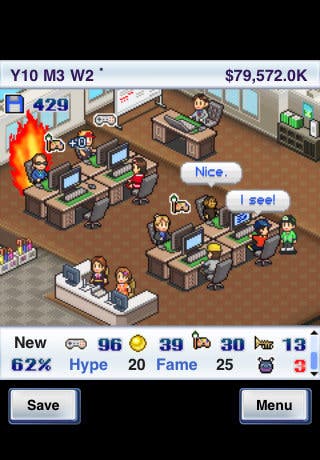Game Dev Story
Dev Con 1.
I've played games that have brought me to the point of existential crisis over my career choice before – Sonic Free Riders, most recently – but Game Dev Story makes me actively hate myself and everyone in my profession. I've been trying for ten game-years to develop a Super Mario Bros. or a Deus Ex or an Ico, you see, but I'm foiled at every turn by the damned reviewers.
I'll pour everything my little company has into making a Robot Shooter or Time Travel Adventure to redefine the genre, and they'll dismiss it in a second with a tepid 5 or 6 and a glib line of criticism. Those miserable, ungrateful, mean-spirited bastards! Don't they know how hard we worked on that? Don't they care?
Thankfully, in Game Dev Story, as in life, it doesn't always matter what the critics think. Kezsoft has scored a couple of million-sellers regardless of its apparent inability to turn out a Hall of Fame-worthy title. Still, I've become obsessed with getting a perfect 10 from someone, pouring millions of dollars and thousands of tiny-sprite-man-hours into ambitious projects, awaiting review scores with my breath held. If this is even a fraction of what it feels like to be on the other side of the fence, I'm going to feel a lot guiltier the next time I dole out a 4/10.

I should mention that this is my third play-through of the games industry management sim. Unlike most mobile games, you haven't seen everything that Game Dev Story has to offer in the space of ten minutes. After 12 hours, I'm on my third company and am still finding new things. It's monstrously absorbing, and at £2.39, it's not only more addictive than crack but considerably cheaper, too.
Starting you off with a tiny team operating out of a single room, Game Dev Story gives you 20 years to realise your game development dreams and become a publishing powerhouse. Consoles, game expos and staff come and go; only you are constant, a sprite manager sitting in a comfortable chair, overseeing your little empire.
Everything you need to do – hire, fire and train staff, plug some cash into advertising, plan a new game – you do from a little menu that pops up when you touch the screen. Stats, like the state of your most recent project, sales figures and company reputation, are in a small bar at the bottom of the screen. It's beautifully simple. As in real life, success depends on careful planning, smart choices and a smidgen of luck.
You'll learn lessons: that hiring one visionary and propping him up with cheap, mediocre staff isn't a recipe for success. That jumping on the licensing bandwagon for new consoles as soon as they come out can burn you badly. And that it's almost impossible to please those anally-retentive reviewers. (Get a real job, you losers!) But everything you learn comes with you into your next play-through. You can keep playing indefinitely past the 20-year mark if you want, but moving on and starting again is both more fun and more productive.

